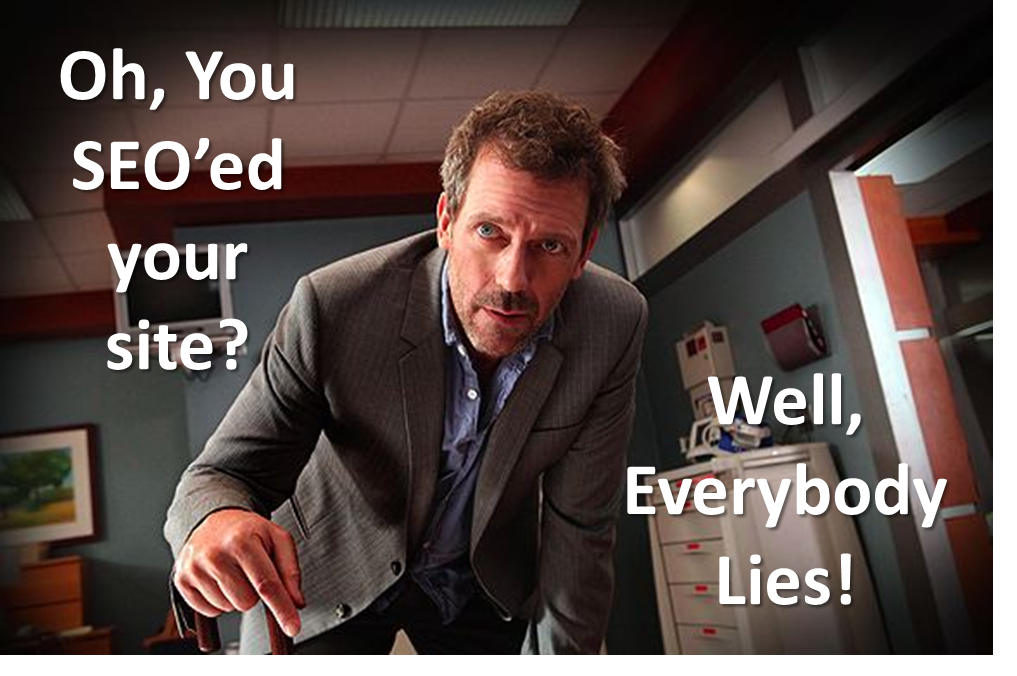What People Do Is The New SEO
This article is all about the lies we tell. I know everyone loves when a post starts this way, but SEO is not dead, or dying for that matter. At least I certainly hope that’s not the case, considering I and many others reading this make a livelihood working in it. But SEO is certainly […]

This article is all about the lies we tell. I know everyone loves when a post starts this way, but SEO is not dead, or dying for that matter. At least I certainly hope that’s not the case, considering I and many others reading this make a livelihood working in it. But SEO is certainly changing, largely because of the lies we tell. And as it continues to evolve it will undoubtedly look very different than it does today.
In fact, if we think about the core goal of Search Engines, it has always been to give the best possible user experience. The search engines have done a fantastic job to date (more or less) to give us these results and deliver us relevant content. More information is being consumed today than ever before.
As time has progressed, SEO has evolved. As more people create and optimize content, content is becoming more “SEO’ed” than it is organic. The goal to enhance the user experience and stay relevant has been put in jeopardy. The nature and goal of SEO hasn’t changed, but the practice has evolved.
Yesterday’s keyword stuffing is just stupid. But it was a threat at one point. Today, it can sometimes be a fine line where we “over SEO-ify” our content. Engines are aware of this too and according to Matt Cutts, it will become something that could harm sites in the future.
This brings us to the problem. Search engines now need to combat overly optimized content with something else of value.
Social Networking Adds To The Equation
I am unsure if anyone is still having conversations about whether or not Facebook alone will beat Google for overall Web dominance. Frankly, I don’t think they will and I know others agree with me.
That being said, a few things which do make Social so appealing however is the fundamental difference in behavior from users.
- Users are much more likely to be “real” when dealing in social since it is their reputations are on the line.
- Social is a more, dare I say, passive method of discovering content. There are no actions taken or searches performed and yet, it works.
- Open Graph, which I continue to stand on a soap box about. Optimizing your Open Graph tags is a huge opportunity for marketers.
All that being said, from a search engine standpoint we know social is important. Google has made it clear that they pay attention to Open Graph signals.
But this is nothing new.
Why SEO Needs To Evolve
So we have reached this point again where the search system needs to evolve. And honestly, it makes perfect sense to me. As AJ Kohn dubbed the “Dr House Effect”, everybody lies.
Not maliciously, but under the ruse of creating “SEO’ed” content. I beg you not to misunderstand my words, because I am not implying that I think SEO is a crock, because it’s not.
Just like anything, done properly, it can be super helpful. But in the wrong hands, can be dangerous and compromise the relevance of our search engines, which have always been under attack from spammers. Which is exactly the reason they need to keep evolving.
For Search Engines to become even more relevant, they need to find a way to understand what we tell them with on page factors, and how they relate to the signals we pass with our actions.
The fundamentals of SEO will still likely remain the same, at least for a while. I do believe that. But like I have said in the past, Entity Search is creeping up. Perhaps it will evolve into something else, but the stark difference between what Search is and what it will become has “action attribution” written all over it making it more real.
Facebook is clearly going after this model and attributing not just what we say we “like” to affect our social graph, but also our everyday actions. What we “do” is the new “like” and the evolution of frictionless sharing is the future of search engines.
Google vs. Facebook Race To The Finish
What most people don’t realize, (I know I didn’t, so again h/t to Aj Kohn for sharing this with me), is that Google is doing the same thing with Google+ and that they have created their own Action API.
I have said it before; Google+ was never about creating a rival social network to Facebook. For them, it’s about improving search results for each and every individual user. Google probably doesn’t even care if you come back to Google+. And knowing this, why should they?
What they do care about is your behavior and what you are doing across the Web. The actions you take on the Web will overtime dictate the new personalized and honest Web of our true actions. Once the engines can narrow this down, the opportunities are unlimited and results are much more relevant.
And The Winner Is…
Google owns the Web, and right now Facebook owns our actions. Considering Facebook’s partnership with Bing and Google+ layering all our activity on Google, I would say both are well positioned to make enormous advancements.
Who will be the winner in this battle for ultimate relevance?
I have my opinion. Find me at SMX Toronto and I might just tell you.
But until then, what is yours?
Contributing authors are invited to create content for Search Engine Land and are chosen for their expertise and contribution to the search community. Our contributors work under the oversight of the editorial staff and contributions are checked for quality and relevance to our readers. The opinions they express are their own.
Related stories
New on Search Engine Land


